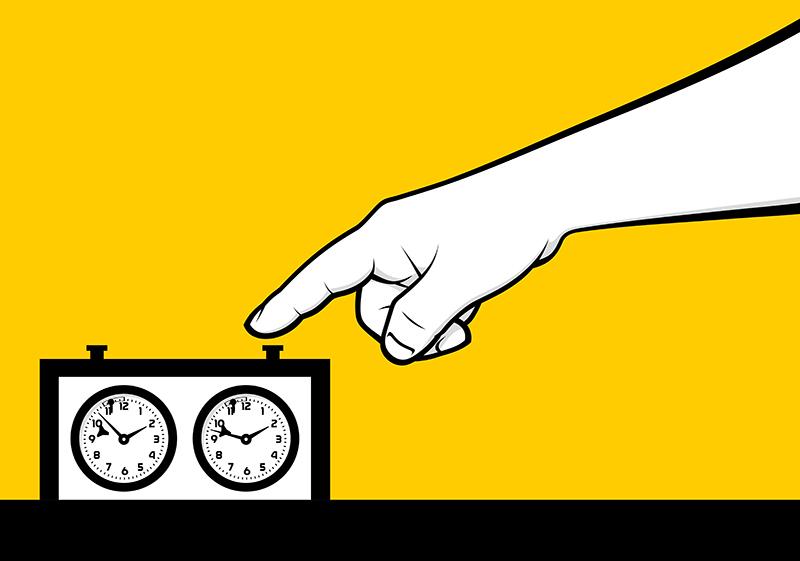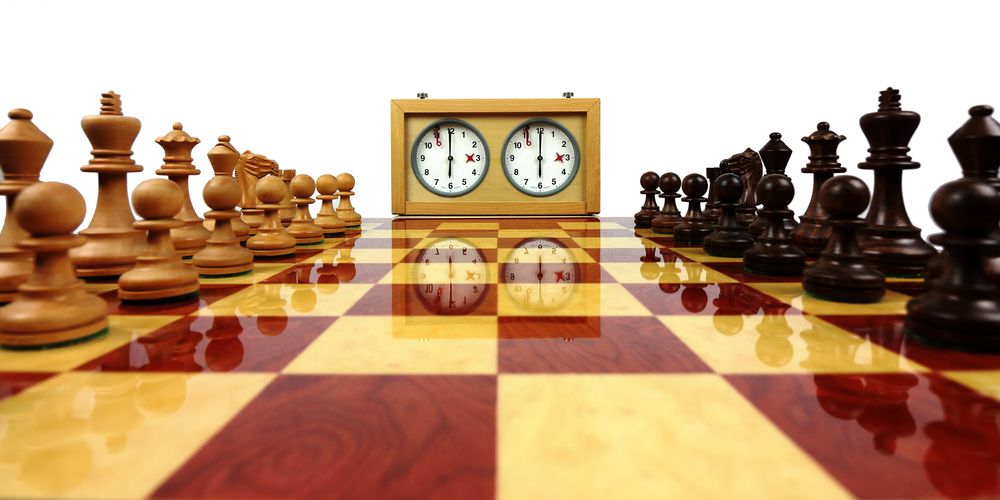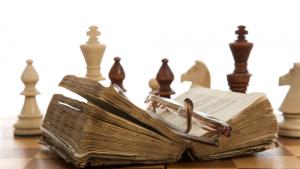
The Art Of Time Management
"We work 25 hours a day."
"But there's only 24 hours in a day!"
"We just wake up an hour earlier."
—Eternal Call, a Soviet TV series (1973-83)
Our society's obsession with time knows few bounds. It is the golden age of atomic watches, appointments, alarm clocks, reminders, digital calendars, and $100 planners. "Alarmy," the app which has prevented me from oversleeping through countless morning exams, forces its masochistic possessor to photograph a pre-specified location in order to silence the deafening tone.
In deference to this trend, we kick off our journey with an exploration of the very thing that makes blitz blitz: time.

In the pantheon of blitz mastery you can find players with every conceivable style: there are gung-ho tacticians, Karpovian boa constrictors, and everything in the middle. But every blitz expert possesses the ability to astutely manage his or her time game in and game out. Now, many players assume that time management essentially comes down to three fundamental principles:
1. You have to be fast;
2. You have to be fast;
3. You have to be fast.
The reality is far more complex. The goal of time management is certainly to be fast, but commanding someone to execute moves at a more rapid pace is useless. The question we will tackle is not whether it is important to be fast and avoid losing on time, but how to be fast and avoid losing on time. Besides, what exactly does fast even mean?
It goes without saying that general chess improvement is directly proportional to speed; generally speaking, the better you are at chess, the better your speed-accuracy tradeoff will be. But time management is an art itself. I have distilled my own philosophy of time management into five principles that I follow to the letter and that have directly contributed to my success in blitz.
Crucially, these principles can be applied regardless of your chess strength. I do not claim that they constitute the ultimate philosophy of time management, but I hope that they will serve as a suitable framework that you can shape to your own style and preferences. Let's plunge in!
Principle 1: Don't forfeit on time before the game starts (literally and figuratively).
It is (hopefully) a reasonable assumption that you have a life outside of blitz. Many blitz aficionados have a job and a family, and a quick game on their phone while awaiting the commuter train may be the only opportunity they have to satisfy their craving. However, the harsh reality is that high-quality blitz requires a high-quality setup. Most of the elements of a high-quality setup are self-evident:
- A decent internet connection.
- A trackpad or mouse that minimizes mouse-slips and maximizes speed. Personally, I have never used a mouse (even for bullet). If you do choose to acquire a blitz-friendly mouse, Hikaru's done the research for you.
- A venue relatively free of distraction. I have played blitz in every conceivable place: coffee shops, lecture halls, libraries, airports, you name it. I have also played blitz while working on homework assignments, eating, texting and even—horror of horrors—talking on the phone. Trust me: it never works. A blitz addiction is a blitz addiction, but it is impossible to play quality chess when the people sitting next to you are discussing virtual currency and slurping on double IPAs.
- A positive mindset. The reality of life is that most of us are always stressed out for one reason or another. But if you are feeling particularly edgy or anxious, it is usually best to skip a blitz session on that day. When negative emotions run high, it is significantly more difficult to play quality chess and resist the urge to tilt if you've lost a few in a row.
This is not an all-encompassing list, but, when taken together, these measures can significantly impact your results, especially in the long run. If you are still skeptical, take a look at these two games.
It is perhaps hard to imagine that these two games were played by the same person, but I can assure you that they were. The only difference is that the first (Parham-Naroditsky) was played in the noisy lounge in my dorm, with the Internet cutting out every few seconds and conversations of every ilk taking place around me.
The second was played in the library, on a large and fast desktop computer with total silence all around. By making it a point to play in an environment that fosters concentration and hard work, you will make the blitz gods (and yourself) mighty happy!

Hikaru Nakamura
Principle 2: Follow the 15-second rule.
On some level, time management boils down to the question of how long to spend on each move. There is obviously no correct answer, but it is a good idea to have some rough guidelines in mind. To formulate a guideline, I endeavored to conduct a scientifically-rigorous, groundbreaking study which is currently being reviewed by four leading data science professors. In the study, I selected three of Hikaru Nakamura's recent blitz wins on Chess.com, and copied down the amount of time he spent on each move. The results, when transferred into a bar graph, are below:

The limitations of this analysis could fill up a book: the sample size is tiny, the sample (Nakamura) is not representative of the general blitz-playing population (more like the opposite), and the list goes on. All the same, I firmly believe that tracing the time allocation of leading blitz players through hundreds of games will yield a distinctly similar distribution.
Okay. But what does it tell us? The number of moves that fell within 0-2 seconds is not particularly surprising, although it can be maximized by applying principle five. What is more revealing is the number of moves that took Hikaru 10 or more seconds to make: three over the course of three games.
Hikaru is not a maniac who pre-moves every single move; he does take his time, but only spends a double-digit amount of time on critical, outcome-deciding moments.
Watch Nakamura's Knockouts 7-18-17 from GMHikaru on www.twitch.tv
Now, it is undeniable that Hikaru's speed is difficult to match by any mortal, which is why, on the basis of my own experience as well as my observations, I propose the 15-second rule: In general, you should only spend 15 seconds or more on a particular move when you believe that a critical position has been reached.
Make no mistake: this is not a hard-and-fast rule, and I'm not expecting to elicit any oohs and aahs by sharing it. All the same, it is important to have a concrete boundary by which you hold yourself accountable. If you find yourself having spent one minute on three moves with little to show for it, give yourself a quick mental nudge to speed up.
3: Slow down when you are winning and when you are lost.
The first part of this principle is uncontroversial. When you are a few steps away from sealing the deal, it can be tempting to ride the momentum by playing needlessly fast...only to stumble on your hubris by blundering a queen or falling into a painfully obvious trap. Let's not belabor the point: if you are winning and have time to spare, take a few moments on each move to check for traps, blunders, and—the ultimate source of tears and shattered furniture—accidental stalemates.
But the second part may appear counterintuitive at first. If you are lost, the folk logic goes, your only hope is to get your opponent into time pressure, so you play faster. This line of thinking is not wrong, but what if you are lost and your opponent has a wagon-load of time remaining? This is often the case when, for instance, you have blundered in the opening. In that case, continuing to play fast in a futile effort to induce time pressure will only accelerate your defeat.
Thus, in situations where you are objectively lost, your only hope generally lies in finding objectively strong defensive moves, or setting traps that actually have a fighting chance of tripping up your opponent. And in order to mount a vigorous resistance, it is often wise to abandon any hopes of flagging and focus squarely on the position.
To see this notion in practice, let's take a look at an over-the-board game between Le Quang Liem and Fabiano Caruana at the 2017 Sinquefield Cup. Technically, this was a rapid game, but the in the segment we are concerned with, both players had under a minute.
It is hard to deny that luck was on Le Quang's side, and a lot of it at that. But good players are always lucky, and by forcing yourself to search for defensive resources as conscientiously as possible, you can save yourself a lot of points.
Principle 4: Optimize your basic checkmating technique.
I vacillated for a while before deciding to include this principle, but ultimately decided that it is too important (and too easily forgotten) to omit. The point at issue is self-explanatory: there are many ways to deliver basic checkmates, and some are much faster (and safer) than others. We have all experienced the unspeakable frustration of running out of time just right before we are able to deliver checkmate. The agony is rendered even more intense if your opponent has one pesky little pawn remaining. To some degree, these scenarios are unavoidable, but players often resign themselves to losing on time when just a few seconds is plenty of time to give checkmate with a queen or a rook.
And what, exactly, are these fastest methods? Here is one instance. If you are cringing at having to play through a rook-vs- king checkmate, worry not: I didn't get fully acquainted with this method until I became a grandmaster.
You get the point. Do yourself a favor, learn these methods, and play a few practice games with the computer (or a friend) optimizing your physical speed. It might not be the most fascinating activity of all time, but you will thank yourself later.
Principle 5: Anticipation is more important than pre-moving.
The day pre-moving was invented was a watershed moment in the history of Internet chess. While it is crucial to master pre-moving—a topic to which I will dedicate an entire article—good old anticipation has, without a doubt, saved me more times than every pre-move I have ever made put together.
Anticipation is a crucial notion in classical chess. Predicting your opponent's moves and understanding his patterns of thinking is an indispensable part of calculation. That said, the real purpose of calculation in classical chess is to ensure the accuracy of your own moves and not to read your opponent's mind at every turn. If your opponent makes an unexpected move, you can take a few seconds to recover and gather your wits.
In blitz, the situation is inverted. The consequences of evaluating two candidate moves instead of five are less severe, but the consequences of being faced with an unexpected move or series of moves can be fatal.
But let's get to the meat. Wait a minute, you might be thinking. Isn't anticipation precisely one of those things that is entirely dependent on general chess strength? Yes and no. All things held equal, grandmasters are more adept at predicting their opponents' choices and generating a suitable reply within a short span of time.
However, as with time management in general, there is a host of specific and applicable mental (and mouse) techniques that you can implement with great effect, whether you are 1400 or 2400 or 3400. Rather than another bullet-point list, we will examine these techniques through the lens of one of my recent games.
And now, deliver the final blow. If you want to truly put yourself in my shoes, give yourself 30 seconds to do so.
That is all I've got on time management...for now. I hope that I was able to strike an equitable balance between the general and the specific with advice that you can implement in your game.
The most important thing is to develop a consistent philosophy of time management and practice it 100 percent of the time. Whether or not these five principles will form the foundation is for you to decide. Blitz on!



